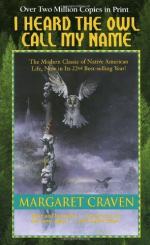|
This section contains 412 words (approx. 2 pages at 400 words per page) |

|
I Heard the Owl Call My Name Summary & Study Guide Description
I Heard the Owl Call My Name Summary & Study Guide includes comprehensive information and analysis to help you understand the book. This study guide contains the following sections:
This detailed literature summary also contains Further Study and a Free Quiz on I Heard the Owl Call My Name by Margaret Craven.
Every so often in American literature, a book appears that captures the attention of a society whose people, in the midst of rapid and dramatic progress, sometimes lose track of the essential truths of American life and the roots from which their industrial age arose.
Henry Thoreau's classic, Walden, for example, points to the values of a simplified life lived in harmony with nature. Mark Twain's Huckleberry Finn takes the reader on a journey into an America where cruelty and injustice had infested a proud and free society, all seen through the eyes of an innocent, "uneducated" boy.
American civilization has witnessed a variety of social experiments dedicated to restoring a "lost" America and revitalizing its people's relationship with nature. Even into the twentieth century, this impulse to appreciate preindustrial society has remained an American tradition. In recent times, much attention has been paid to the Native Americans—their traditional coexistence with the natural world and their battles against cultural extinction.
Craven's novel, often classified as an "inspirational" best seller, is a fascinating and unusual document based on the author's experiences. The narrative travels into the heart of one tribe, describing for the reader the lessons the Kwakiutl taught to the author. In a society dominated by high technology, a capitalist economic system, and rapid cultural change, Craven's novel transports young readers into another dimension—the rugged lives of a people who have remained unchanged for centuries and whose existence and livelihood are still governed by the cycle of the seasons. This realistic book incorporates humor and tragedy, triumph and defeat, joy and despair. It records the struggles of growing up and the difficulty people from different cultures have in finding common meaning. All in all, the work shows that human concerns are the same everywhere.
Beyond its lavish description of British Columbia—one of the most beautiful areas in North America—the novel deals with the tragedy of a disappearing culture, the hope that things will change, and the dilemma of young people torn between upholding native tradition and assimilating into the "white man's world." Most importantly, Craven encourages readers to confront the most problematic question of all: how does one prepare for and face death?
A rich portrayal of basic North American traditions and cultural understanding, I Heard the Owl Call My Name provides a means by which readers can gain an awareness of some essential matters that contemporary living too often denies them.
Read more from the Study Guide
|
This section contains 412 words (approx. 2 pages at 400 words per page) |

|



